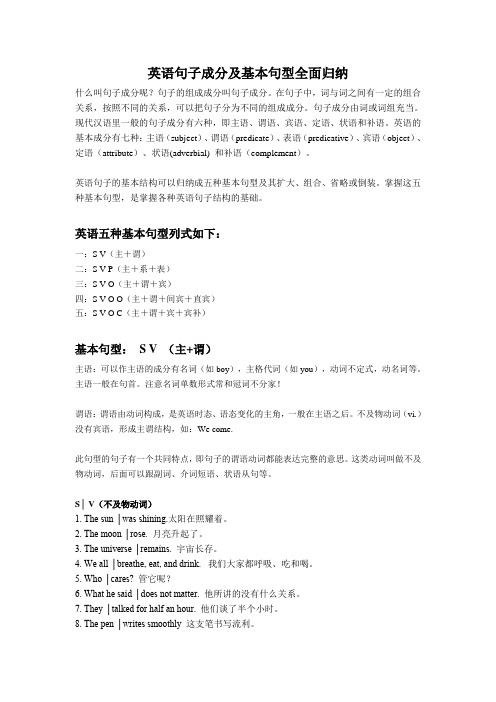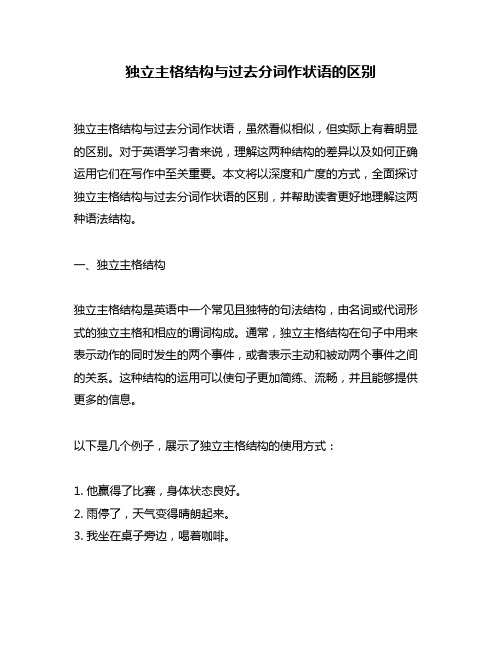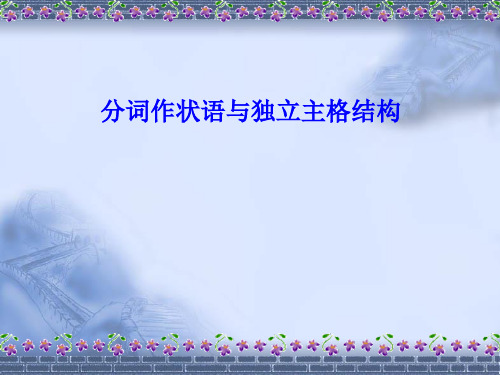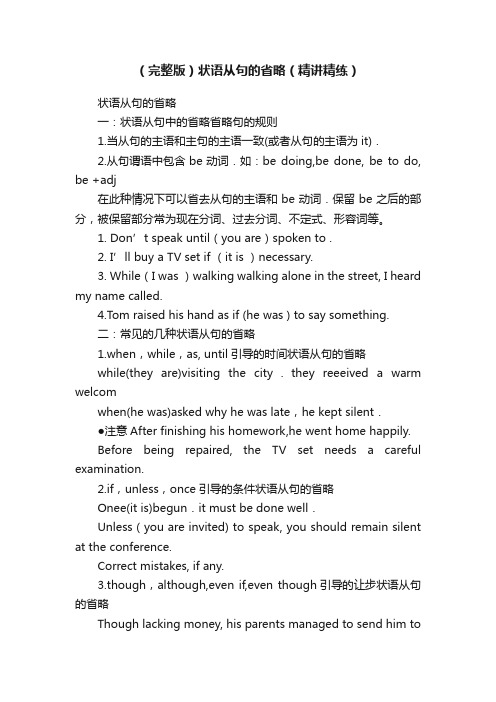分词、独立结构、状语中省略比较
英语句子成分及基本句型全面归纳

英语句子成分及基本句型全面归纳什么叫句子成分呢?句子的组成成分叫句子成分。
在句子中,词与词之间有一定的组合关系,按照不同的关系,可以把句子分为不同的组成成分。
句子成分由词或词组充当。
现代汉语里一般的句子成分有六种,即主语、谓语、宾语、定语、状语和补语。
英语的基本成分有七种:主语(subject)、谓语(predicate)、表语(predicative)、宾语(object)、定语(attribute)、状语(adverbial) 和补语(complement)。
英语句子的基本结构可以归纳成五种基本句型及其扩大、组合、省略或倒装。
掌握这五种基本句型,是掌握各种英语句子结构的基础。
英语五种基本句型列式如下:一:S V(主+谓)二:S V P(主+系+表)三:S V O(主+谓+宾)四:S V O O(主+谓+间宾+直宾)五:S V O C(主+谓+宾+宾补)基本句型:S V (主+谓)主语:可以作主语的成分有名词(如boy),主格代词(如you),动词不定式,动名词等。
主语一般在句首。
注意名词单数形式常和冠词不分家!谓语:谓语由动词构成,是英语时态、语态变化的主角,一般在主语之后。
不及物动词(vi.)没有宾语,形成主谓结构,如:We come.此句型的句子有一个共同特点,即句子的谓语动词都能表达完整的意思。
这类动词叫做不及物动词,后面可以跟副词、介词短语、状语从句等。
S│ V(不及物动词)1. The sun │was shining.太阳在照耀着。
2. The moon │rose. 月亮升起了。
3. The universe │remains. 宇宙长存。
4. We all │breathe, eat, and drink. 我们大家都呼吸、吃和喝。
5. Who │cares? 管它呢?6. What he said │does not matter. 他所讲的没有什么关系。
7. They │talked for half an hour. 他们谈了半个小时。
独立主格结构和分词结构在句子中的修饰作用

独立主格结构和分词结构在句子中的修饰作用独立主格结构和分词结构是英语语法中常见的句子修饰结构。
它们能够更好地表达句子的修饰关系,增加句子的表达力和语法多样性。
本文将详细介绍独立主格结构和分词结构在句子中的修饰作用。
一、独立主格结构的修饰作用独立主格结构由名词或代词作主语,加上一个分词或不定式构成。
它在句子中作状语,修饰整个句子或主句的主语。
独立主格结构通常用于表示时间、原因、条件等,并且能够使句子更加生动、详细。
下面是一些例子:1. 着急赶作业,时间不够,小明焦虑不安。
2. 天气晴朗,他们开心地出门。
3. 寒风刺骨,她看着外面的世界感到孤独。
4. 跑了一圈,他满头大汗。
5. 头晕脑胀,她勉强坚持了一整天。
从以上例子可以看出,独立主格结构在句子中起到了修饰的作用,丰富了句子的表达方式,使得句子更加生动、有趣。
二、分词结构的修饰作用分词结构是由分词及其修饰成分构成的结构,它可以在句子中作状语、定语或补语。
分词结构通常用于描述句子的主语,表示时间、原因、方式等。
下面是一些例子:1. 坐在沙发上,她看着电视。
2. 吵闹的街道上,行人匆匆而过。
3. 热气腾腾的汤,散发着诱人的香味。
4. 走在泥泞的小道上,他们的鞋子沾满了泥巴。
5. 通过努力学习,他们终于获得了优秀的成绩。
从以上例子可以看出,分词结构能够在句子中起到修饰主语的作用,丰富了句子的表达方式,使得句子更加具体、生动。
总结:独立主格结构和分词结构在句子中的修饰作用是非常重要的,它们能够使句子更加完整、丰富。
通过运用独立主格结构和分词结构,我们可以更好地表达句子的修饰关系,使得句子更有层次感、更具有语法多样性。
在写作中,我们应该灵活运用独立主格结构和分词结构,提高句子的表达能力和语法水平。
另外,我们需要注意在运用独立主格结构和分词结构时,要保持语句的通顺和整洁美观。
避免句子过于复杂或使用过多的修饰结构,以免影响读者的阅读体验。
最后,我们应该根据具体的语境和写作需求来选择合适的修饰结构,使得句子更具有说服力和表现力。
初中英语定语、状语、同位语、独立成分、分词独立结构

初中英语定语、状语、同位语、独立成分、分词独立结构但常用的英语句子并不像基本句型这样简短,这些句子除了基本句型的成分不变外,通常是在这些成分的前面或后面增加一些修饰语(modifier)而加以扩大。
这些修饰语可以是单词(主要是形容词、副词和数词),也可以是各种类型的短语(主要是介词短语、不定式短语和分词短语)。
我们称之为:定语、状语。
1.定语:定语是对名词或代词起修饰、限定作用的词、短语或句子,汉语中常用“……的”表示。
定语通常位于被修饰的成分前。
若修饰some, any, every, no构成的复合不定代词时,(如:something、nothing);或不定式、分词短语作定语,从句作定语时,则定语通常置后。
副词用作定语时须放在名词之后。
形容词作定语:The little boy needs a blue pen.(little修饰名词boy;blue修饰名词pen.)小男孩需要一支兰色的钢笔。
Tom is a handsome boy. 汤姆是个英俊的男孩。
There is a good boy. 有个好男孩。
数词作定语相当于形容词:Two boys need two pens.两个男孩需要两支钢笔。
The two boys are students.这两个男孩是学生。
There are two boys in the room.房间里有两个男孩。
代词或名词所有格作定语:His boy needs Tom's pen.他的儿子需要汤姆的钢笔。
His name is T om.他的名字是汤姆。
There are two boys of Toms there.那儿有汤姆家的两个男孩。
介词短语作定语:The boy in the classroom needs a pen of yours.教室里的男孩需要你的一支钢笔。
The boy in blue is Tom.穿蓝色衣服的孩子是汤姆。
独立主格结构与过去分词作状语的区别

独立主格结构与过去分词作状语的区别独立主格结构与过去分词作状语,虽然看似相似,但实际上有着明显的区别。
对于英语学习者来说,理解这两种结构的差异以及如何正确运用它们在写作中至关重要。
本文将以深度和广度的方式,全面探讨独立主格结构与过去分词作状语的区别,并帮助读者更好地理解这两种语法结构。
一、独立主格结构独立主格结构是英语中一个常见且独特的句法结构,由名词或代词形式的独立主格和相应的谓词构成。
通常,独立主格结构在句子中用来表示动作的同时发生的两个事件,或者表示主动和被动两个事件之间的关系。
这种结构的运用可以使句子更加简练、流畅,并且能够提供更多的信息。
以下是几个例子,展示了独立主格结构的使用方式:1. 他赢得了比赛,身体状态良好。
2. 雨停了,天气变得晴朗起来。
3. 我坐在桌子旁边,喝着咖啡。
从这些例子可以看出,独立主格结构的谓词部分常常是一个动词的过去分词形式。
这与过去分词作状语的形式有点类似,但它们之间有着不同的用法和含义。
二、过去分词作状语过去分词作状语是一种常见的状语结构,用来修饰动作的方式、原因、时间或条件。
过去分词作状语通常位于句子开头或句子的中间,用来修饰整个句子或其中的某个成分。
它可以提供额外的信息,丰富句子的意义和表达。
以下是几个例子,展示了过去分词作状语的使用方式:1. 穿过森林,他找到了一家小屋。
2. 因为下雨了,他没有出去玩。
3. 在经历了一番波折之后,他最终成功了。
从这些例子可以看出,过去分词作状语的谓词部分也是一个动词的过去分词形式。
然而,过去分词作状语强调的是修饰整个句子或其中一个成分的状语关系,而不是像独立主格结构那样突出两个同时发生的事件或主动和被动事件之间的关系。
三、区别与用法尽管独立主格结构和过去分词作状语的形式相似,但它们之间存在着明显的区别。
了解这些区别可以帮助我们更加准确地运用这两种结构,并提高写作的表达能力。
独立主格结构强调的是两个同时发生的事件或主动和被动两个事件之间的关系。
分词作状语与独立主格结构(精华主讲)

Having been discussed several times, the decision was finally made. 进行了几次讨论后,终于做出了决定。
小练习:用所给动词的正确形式填空
5. 让步状语 Beaten by the police and sent to jail, Gandi created the principle of nonviolent resistance. 尽管受警察的殴打,被投入监狱,甘地却首创了非 暴力抵抗的原则。 Defeated again, he didn’t lose heart.
注意:现在分词和过去分词的特别之处
6.独立成份(插入语) Given good weather, our ship will reach Shanghai on Monday evening.
假如天气好,我们的船将于星期一晚上到达上海。 I’d come and see you in New York, given the chance.
5.让步状语:如:
Knowing all this, they made me pay for the damage.他们尽管了解这一切,还是要我们 赔偿损失。
6.独立成份(插入语)
Generally speaking, people all believe what he has said. 一般说来,人们都相信他所说的。
He said that the leaves of his flowers had turned yellow. He thought that it was due to a water shortage so he applied more water, only making things worse. 他说他的花的叶子变黄了.他想是缺水所致,于是多浇了水,结 果反而更遭。
状语从句的省略

状语从句的省略
在时间、条件和让步等状语从句中, 如果从句主语和主句的主语一致, 且从 句的谓语含有be动词的某种形式, 从句 的主语和be动词可以省略, 并且要同时 省略。
状语从句省略句的结构: 连词+分词(-ing、-ed)/形容词
特点: 1.从句主语与主句主语相同 2.从句中谓语动词含有be动词
谢谢
2. When asked to answer questions, you should stand up._ )
3. He will help us do it, if necessary.
(if 后省略了 _it__is__ )
当从句的主语是 it,谓语动词中又含有系动词be 时 , 可以把it和系动词be一起省略. if necessary/possible/if true/so/not
4.由 as ,than 等引导的比较状语从句; 5.由as,as if ,as though 等引导的方式状语从句.
[熟读深思] 阅读下列句子, 指出划线句中省 略的单词
1. The country singers were playing the
guitar while singing.
(while 后省略了_t_h_e_y_w__e_r_e )
一般说来省略现象多出现在下列五种状语从句 中:
1.由when ,while ,as ,before, after, till, until, once等引导的时间状语从句; 2.由whether ,if ,unless 等引导的条件状语从句; 3.由 though ,although ,even if ,whatever等引 导的让步状语从句;
分词作状语与独立主格结构(精华主讲)

Written in a hurry, this article was not so good. 因为写得匆忙,这篇文章不是很好。
Reading carefully, he found something he hadn’t known before. 他仔细读书时,发现了一些从前不知道的东西。
4. 方式或伴随状语 Surrounded by his students, the professor sat there cheerfully.
那位教授在学生的簇拥下,兴高采烈地坐在那儿。 He stood there silently, moved to tears.
他静静地站在那里,被感动得热泪盈眶。 The old man went into the room, supported by his wife. 那位老人在妻子的搀扶下,走进了房间。
注意:现在分词和过去分词的特别之处
6.独立成份(插入语) Given good weather, our ship will reach Shanghai on Monday evening.
假如天气好,我们的船将于星期一晚上到达上海。 I’d come and see you in New York, given the chance.
3. 条件状语(相当于条件状语从句)如: Seen in this aspect, the matter isn’t as serious as people generally suppose. 如果从这个角度看,问题并不 像人们一般预料的那样`严重。 Grown in rich soil, these seeds can grow fast. 如果种在 肥沃的土壤里,这些种子能长得很快。 Given better attention, the accident could have been avoided. 要是多加注意,那次事故就能避免了。 Watered more, these cabbages could have grown better. 如果多浇点水,这些大白菜还可以长的得更好。 Compared with you, we still have a long way to go. 和 你相比,我们还有很大的差距。
(完整版)状语从句的省略(精讲精练)

(完整版)状语从句的省略(精讲精练)状语从句的省略一:状语从句中的省略省略句的规则1.当从句的主语和主句的主语一致(或者从句的主语为it).2.从句谓语中包含be动词.如:be doing,be done, be to do, be +adj在此种情况下可以省去从句的主语和be动词.保留be之后的部分,被保留部分常为现在分词、过去分词、不定式、形容词等。
1. Don’t speak until(you are)spoken to .2. I’ll buy a TV set if (it is )necessary.3. While(I was )walking walking alone in the street, I heard my name called.4.Tom raised his hand as if (he was ) to say something.二:常见的几种状语从句的省略1.when,while,as, until引导的时间状语从句的省略while(they are)visiting the city.they reeeived a warm welcomwhen(he was)asked why he was late,he kept silent.●注意After finishing his homework,he went home happily.Before being repaired, the TV set needs a careful examination.2.if,unless,once引导的条件状语从句的省略Onee(it is)begun.it must be done well.Unless(you are invited) to speak, you should remain silent at the conference.Correct mistakes, if any.3.though,although,even if,even though引导的让步状语从句的省略Though lacking money, his parents managed to send him touniversity.4.as though,as if,as引导的方式状语从句的省略He shook his head as if (he was)to say: “Don’t trust her”.She left the room hurriedly as if( she was) angry.He stared at the girl as if (he was) seeing her for the first time.You should finish the homework as (you are)required.5. than引导的比较状语从句的省略They sent us much more materials than required.1._____________________ (在北京的时候), I paid a visit to the Summer Palace.2. ____________________(当是个年轻人的时候), Abraham Lincoln was a storekeeper and a postmaster.3.He has no money_____(要是有的话), he will give us.4._____________(除非修理), the machine is of no use.5. _______________________(要是给更多的关注), The boy could have turned out better.6. A girl stood at the gate of the school as if _________ _____________________(跟老师讲话).7.这次展览比预料的有趣.8..她张开嘴好象要大哭起来.9.除非邀请,否则我不会去参加这次晚会.10.明天早点起来,要是不起来的话,你就赶不上第一班车了.11当我在做作业时,我听到有人喊救命.12.他篮球打得即使没你好,也起码一样好.1.When ________ , the museum will open to the public next year . (complete)2.The flowers his friend gave him will die unless _______every day. (water)3. The boss, not the workers should be responsible for the accident. They just carried out the order as__(tell4. When _______what they needed most, the kids said they wanted to feel important and loved. ( ask)5.One day while ________(work) at the cash register in the gift shop,I saw an elderly couple.6.When_______(finish),the knot looks identical from both the front and back.7.They promise to take action,_____needed, to maintain financial stability in the euro area as a whole.8.The building was still shaking while I_______(walk) along the road.9.Friendship is like money: easier made than _____ .(keep)10.When I was at your age my father told me that I should go and work wherever ____ most. (need)二since,before,after引导的状语从句有时可以变成介词短语或分词短语。
- 1、下载文档前请自行甄别文档内容的完整性,平台不提供额外的编辑、内容补充、找答案等附加服务。
- 2、"仅部分预览"的文档,不可在线预览部分如存在完整性等问题,可反馈申请退款(可完整预览的文档不适用该条件!)。
- 3、如文档侵犯您的权益,请联系客服反馈,我们会尽快为您处理(人工客服工作时间:9:00-18:30)。
分词作状语
1.分词和分词短语作状语时,可以表示时间,原因,条 件,让步,方式和伴随情况。在表示时间,原因,条 件,让步时,通常可以转换为相应的状语从句;表示 方式和伴随情况时,可以转换为一个并列的谓语成分。 例如:
方式和伴随情况
时间,原因,条件,让步
相应的状语从句
并列的谓语成分
在表示时间,原因,条件,让步时,
A. 现在分词 B. 过去分词
2.分词作状语与主句的关系 A. 现在分词作状语时,其逻辑主语通常要与句子的主语 保持一致,即句子的主语就是动词-ing的动作执行者, 即句子主语与动词-ing的动作构成主动关系。 注:如果现在分词所表示的动作发生在主句谓语动词表示 的动作之前,分词要用完成式。 eg.
NO.215
状语从句 中的省略
分词作状语
独立结构/独 立主格结构
在含有状语从句的复合句中若从句的主句是it或与主句 的主语相同,且在谓语中含有be时,常省略从句的主 语和be。
When he is asking the teacher, he is polite. When asking the teacher, he is polite.
Though he worked very hard, he didn’t feel a bit tired .
表示方式和伴随情况时,可以转换为一个并列的谓语成分。
5. The children went away laughing .(现在分词作行 为方式状语)
The children went away laughing. Thteacher, he is polite. When he is asking the teacher, he is polite.
When asking the teacher, he is polite.
The last train having gone, we had to walk home. 最后一班车开走了,我们只好步行回家。 Weather permitting, we’ll play football. 天气也许的话,我们将举行足球赛。
Learning some simple Chinese, the girl was able to
communicate with us.
After learning some simple Chinese, the girl was able to communicate with us.
分词
Unless repaired 除非修理), the machine is of no use. 3._____________(
If any (要是有的话), he will 3. He has no money. ______ give us.
2.当从句的主语与主句的主语一致,且谓语动词是 非be动词,从句可以省略主语,从句的谓语动词采 用其V-ing结构。例如:
Although he worked very hard , he failed in the final exam. Although working very hard, he failed in the final exam.
After she took the medicine , she felt much better. After taking the medicine, she felt much better.
When asking the teacher, When asked by the teacher, he is polite.
While on a visit to New York, 现在分词 he answered politely. yet across a child,John. 过去分词 When he came 连词+
通常可以转换为相应的状语从句
1. Seeing the teacher entering the room, the students stood up.(现在分词作时间状语) When the students saw the teacher entering the room, they stood up.
They went。 6. I stood there, listening to the broadcast.(现在分词 作伴随状语) I stood there and listened to the broadcast
分词作状语
2.分词作状语时前面可用连词 若分词的逻辑主语与主句主语相同时,且所表示的 动作与谓语动词所表示的动作同时发生,那么分词结 构前面可放上适当的连词引导。 eg.
Given more attention, the trees could have grown better.
Seen from the top of the tower, the river looks like a snake.
独立结构/独立主格结构
分词作状语时要特别注意其逻辑主语和主句的主语一 致,否则分词必须有自己独立的主语、这种带主语的 分词结构称作分词的独立结构,或独立主格。 The last train having gone, we had to walk home. 注: 最后一班车开走了,我们只好步行回家。 区别分词作状语与独立主格主要是看状语部分是否有自己 Weather permitting, we’ll play football. 独立的主语, 如果有独立的主语就是独立主格,否则就是 天气也许的话,我们将举行足球赛。 分词作状语。
介词短语 he +主句 could writ poems. 名词
1._____________________ When/While in Beijing (在北京的时候), I paid a visit to the Summer Palace.
When/As a young man 当是个年轻人的时候), 2.______________________( Abraham Lincoln was a storekeeper and a postmaster.
While walking along the street early in the morning, he saw her.
Unless (being) rich, I am not going abroad. 除非有钱,否则我是不会出国的。
asking the teacher, he is polite.
When he is asking the teacher, he is polite.
When asking the teacher, he is polite.
After she learned some simple Chinese, the girl was
able to communicate with us.
Travelling by car, we visited many places. 我们乘车游览了许多地方。
Having finished his homework, he went to bed. 写完作业,他就上床睡觉了。
2.分词作状语与主句的关系 B. 过去分词作状语时,要特别注意其逻辑主语也必须与 句子的主语保持一致。但过去分词表示的动作是句子 主语承受的动作他们之间的关系是被动关系。 注:如果现在分词所表示的动作发生在主句谓语动词表示 的动作之前,分词要用完成式。 eg.
连词+现在分词
状语从句中的省略
When he was asked by the teacher, he
answered politely. When asked by the teacher, he answered politely. 连词+过去分词
状语从句和状语从句中的省略 While he was on a visit to New York, he came
2. Heated, ice will be changed into water.(过去分词作条 件、时间状语)
When the students saw the teacher entering the room, they stood up.
在表示时间,原因,条件,让步时,
通常可以转换为相应的状语从句
3. Being excited, I couldn’t go to sleep .(现在分词作 原因状语) As I was excised ,I couldn’t go to sleep.
4. Working very hard, he didn’t feel a bit tired .(现在 分词作让步状语)
across John
While on a visit to New York, he came across John. 连词+介词
When he was yet a child, he could writ poems. When yet a child, he could writ poems. 连词+名词
